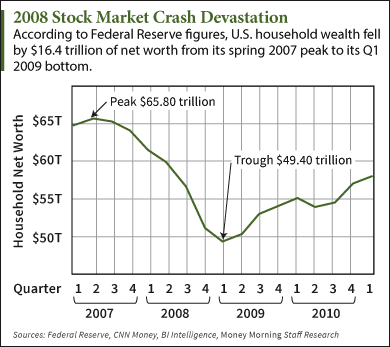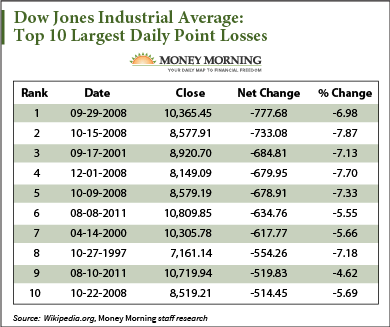The third in our series documenting the most devastating events in stock market crash history...
"We take a buck, we shoot it full of steroids and we call it leverage." - Gordon Gekko, "Wall Street II."
 The 2008 stock market crash destroyed $16.4 trillion of American households' net worth from 2007 through 2009. It wiped out more than $2 trillion of Americans' retirement savings.
The 2008 stock market crash destroyed $16.4 trillion of American households' net worth from 2007 through 2009. It wiped out more than $2 trillion of Americans' retirement savings.
The Dow Jones Industrial Average fell from its high of 14,164.43 reached on Oct. 9, 2007, to 6,443.27 by March 6, 2009 - a 54% plunge in little under 18 months.
During that time, the Dow hit these gloomy milestones:
- The biggest ever single-day crash in Dow Jones history occurred on Sept. 29, 2008, when the U.S. House of Representatives rejected the government's $700 billion bank bailout The Dow dropped 777.68 points (6.98%) -- obliterating $1.2 trillion in market value.
- The index's second biggest single-day loss happened just six days later on Oct. 15, 2008. This time, recession talk fueled the 7.9% decline.
- Subprime financial crisis-related events that triggered the top two largest single-day Dow drops also accounted for the fourth, fifth, and tenth largest single-day crashes in Dow history, all occurring in 2008.
- The Dow crashed 18.1% the week of Monday, Oct. 6, 2008, alone.
Here's a look at the events that caused the stock market crash of 2008...
What Caused the 2008 Stock Market Crash: Housing Bubble Led to Subprime Lending
Just like Parts I and II in our stock market crash history series (covering the stock market crash of 1929 and the dot-com crash of 2000-2002), the 2008 stock market crash, boiled down, was caused by a speculative bubble. In 1929, it was speculation over the railroad industry; in 2000, it was speculation over Internet companies; and in 2008, it was speculation over real estate.
From 1996 to 2006, home prices nearly doubled. Robert Shiller's Home Price Index went from 87.0 to 160.6. About 65% of this growth occurred from 2002 to peak prices in 2006.
When the bubble burst, prices quickly plunged. The index was at 105.7 by 2009. This surge in growth followed by rapid decline is unprecedented in the history of U.S. real housing prices, according to the U.S. Bureau of Labor Statistics.
These factors fueled the run-up in housing prices:
- The aftermath of the dot-com crash. After 2000, investors turned away from tech to real estate as an alternative investment.
- The low interest rates set by the Federal Reserve in the 1990s and 2000s provided further incentive for home buying.
- Relaxed lending standards helped demand continue when prices reached levels that most people could not otherwise have afforded...
You see, building up to the start of the collapse in 2007, the subprime mortgage industry thrived. Historically, less than 8% of home loans given out annually were subprime loans. But from 2004 to 2006, that rate ran up to roughly 20%, with much higher rates in certain parts of the country.
Meanwhile, U.S. households became increasingly indebted. The ratio of debt to disposable personal income almost doubled from 77% in 1990 to 127% by the end of 2007.
In other words, people were given access to loans they could not afford: predatory loans.
But as long as home prices continued to skyrocket, these predatory lending practices continued.
That's because banks could afford to give bad loans, so long as borrowing homeowners' equity outpaced their debt. That's because when a borrower defaulted, the bank could foreclose on the home without taking a loss, since it was an asset with ever-increasing value.
Stock market crash trouble began when the housing bubble steeply declined in 2007. By 2009, housing prices had fallen 30% from their 2006 peak...
What Caused the 2008 Stock Market Crash: End of the Bubble Triggered the Fall
People who were offered and took loans well out of their price range began to default because they couldn't afford the payments.
 Contributing to this was that a high percentage of the subprime loans that had been given out in the bubble were adjustable-rate mortgages (ARMs). In 2006, 90% of subprime mortgages in the United States were ARMs.
Contributing to this was that a high percentage of the subprime loans that had been given out in the bubble were adjustable-rate mortgages (ARMs). In 2006, 90% of subprime mortgages in the United States were ARMs.
ARMs offer borrowers special "teaser" rates in the first year or two. But thereafter, payments skyrocket because rates adjust to the outstanding loan balance. Once the initial teaser rate ran out, homeowners could not afford their mortgage payments and defaulted.
Homeowners "went underwater" on their loans -- they owed lenders more than the home was worth. According to consumer analytics firm CoreLogic, 11.1 million residential properties in the United States, or 23.1% of all American homes, were in negative equity on Dec. 31, 2010.
Once default rates spiked, the U.S. economy began to falter. U.S. financial institutions began to collapse due to exposure of securities backed with mortgages -- mortgages that had just lost all their value. Global investors began to drastically reduce purchases of mortgage-backed debt and other securities.
"The real reasons behind the sell-off ... include the bursting of history's biggest housing bubble, which triggered a shockwave of wealth destruction that has wreaked widespread havoc throughout the economy, as well as the unraveling of a multi-trillion-dollar financial house of cards built on greed, ignorance, and fraud," Michael J. Panzner, author of Financial Armageddon and When Giants Fall, wrote in a Huffington Post op-ed on May 25, 2011. "Throw in the fact that stock prices had been supported by earnings and expectations about the future that had little basis in reality and it's not hard to see why the bears have been in control during the past year-and-a-half or so."
The events sent shockwaves around the world. In addition to the United States, banks failed in Europe, and stocks and commodities plummeted worldwide. The unemployment rate doubled from 5% (7 million Americans unemployed) pre-crisis in 2008 to 10% by the end of 2009 (15 million).
[epom key="ddec3ef33420ef7c9964a4695c349764" redirect="" sourceid="" imported="false"]
To date, little has been done to punish the Wall Street players and their Capitol Hill cronies who intentionally carried out predatory loan practices and whipped up subprime-backed securities.
The 2008 stock market crash was the third in our series of the greatest stock market crashes in U.S. history. Stay tuned to www.MoneyMorning.com for our next installment, and tweet the author @TaraKateClarke with any comments.
We Call It the "Washington-Wall Street Corruption Corridor." They earned millions in salary and commission, triggered the 2008 stock market crash, and left U.S. taxpayers to foot the bill. And these 10 people are the most responsible for causing the crisis...


